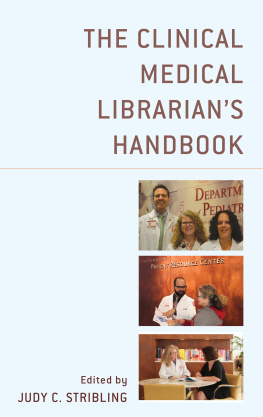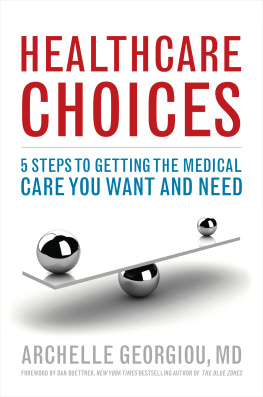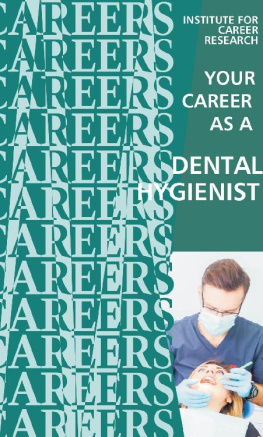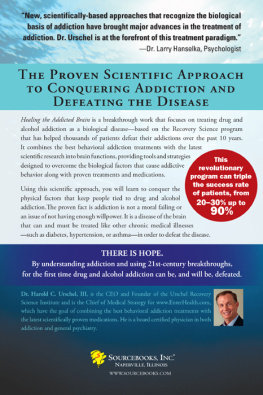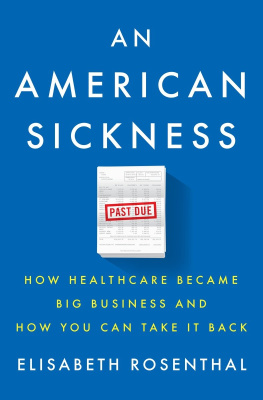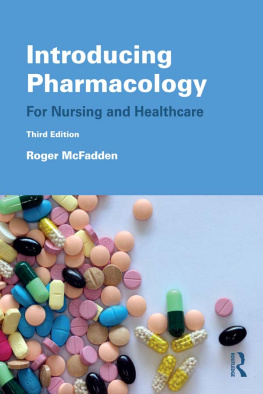ADDICTED
HEALERS
ADDICTED
HEALERS
5 Key Signs Your Healthcare Professional
May Be Drug Impaired
Ethan O. Bryson, MD
New Horizon Press
Far Hills, NJ
Copyright 2012 by Ethan O. Bryson, MD
All rights reserved. No portion of this book may be reproduced or transmitted in any form whatsoever, including electronic, mechanical or any information storage or retrieval system, except as may be expressly permitted in the 1976 Copyright Act or in writing from the publisher.
Requests for permission should be addressed to:
New Horizon Press
P.O. Box 669
Far Hills, NJ 07931
Ethan O. Bryson, MD
Addicted Healers:
5 Key Signs Your Healthcare Professional May Be Drug Impaired
Cover design: Bob Aulicino
Interior design: Scribe Inc.
Library of Congress Control Number: 2012932036
ISBN-13 (eBook): 978-0-88282-412-3
New Horizon Press
Manufactured in the U.S.A.
161514131212345
For my wife Amity, our son Brady and our mom Linda.
Your love and support not only makes my work possible
but also makes it worthwhile.
AUTHORS NOTE
T his book is based on the authors research, personal experience, interviews and real life experiences. In order to protect privacy, names have been changed and identifying characteristics have been altered except for some contributing experts.
For purposes of simplifying usage, the pronouns his/her and s/he are sometimes used interchangeably. The information contained herein is not meant to be a substitute for professional evaluation and therapy with mental health professionals.
CONTENTS
D r. Bernards day began at 4:30 A.M. when his bedside alarm interrupted his fifth hour of sleep. Most nights he was able to get six, sometimes seven hours straight, provided his child wasnt ill or the dog didnt need to go out, but the previous night had been another late night at the hospital and he hadnt gotten home until after ten. It seemed that he barely had enough time to recover each night before he had to return to work. Things had been changing a lot in his practice latelyin everyones practices, it seemedand there were more and more of these long working days each year. On top of this, the insurance companies continued to cut their reimbursements for his services and Medicare no longer covered the costs of providing care to his patients. So it was in this context of reduced income and increased responsibility that Dr. Bernard wondered how he was going to come up with enough money to make his mortgage payment, cover the costs of his sons special education and still be able to pay all of his monthly bills.
By 6:00 A.M., after a shower and two cups of coffee during the drive into the city, Dr. Bernard had reached the hospital, had changed into scrubs and was examining the days schedule of cases. As the clinical coordinator, he was the attending anesthesiologist responsible for maintaining the flow of one of the busiest hospital-based operating facilities in the city. His group provided coverage for over fifty different operating rooms within the main hospital as well as several off-site locations, including the radiology department, where MRIs (magnetic resonance imaging) and CAT scans (computed axial tomography) were performed, the special procedures suites, where interventional radiologists coiled cerebral aneurysms and cardiologists performed catheterizations, and the labor floor, which consisted of fifteen labor and delivery rooms and three special operating rooms devoted entirely to pregnant patients.
R aul Sanchez had not been able to sleep at all. The pain in his gut kept getting worse and he had to get out of bed to go to the bathroom every hour or so. He tried to convince himself that it was the Chinese take-out food he and his wife had for dinner that night that had done this to him, but he had been sick with food poisoning before and this felt different. He couldnt identify exactly how it was different, because the pain was distracting him enough so that he couldnt really think straight, but he had a feeling of impending doom, like something terrible was about to happen. At 5:20 A.M., the world seemed to grow dim briefly and then he fell backwards into unconsciousness. Irma, who up until then had been sleeping soundly despite her husbands constant movement in and out of bed, awoke with a start. After forty-five years of marriage they shared a bond that ran deeper than most. Immediately she knew that something was not right. The light was on in the bathroom down the hall, so she could see well enough as she turned to look at her husband. He was completely still and looked almost gray. Irma shook Raul frantically but could not wake him up. In an instant she was out of bed and running into the kitchen, where their only telephone sat on the counter by the sink. Irma called 911. The operator dispatched an ambulance and then calmly told Irma what she needed to do for her husband. She ran back into the bedroom to check on him. Raul was not breathing; at least she didnt think he was, but how could she know? She checked his wrist but could not find a pulse either. The operator had said to breathe for him and then to push on his chest. Irma tried her best until the paramedics arrived.
By 5:35 A.M., Raul was on a stretcher in the back of an ambulance racing toward the hospital where Dr. Bernard practiced. Irma sat in the back of the rig and watched as one paramedic carefully placed a breathing tube in her husband while the other continued to press violently on his chest. A fireman was driving and, as he raced against the early morning traffic, the paramedics raced to save Rauls life. Within ten minutes the ambulance arrived at the hospital and before the paramedics could carry Raul out of the rig, Dr. Wu, an emergency medicine physician, was examining him. Dr. Wu conducted an ultrasound examination which confirmed the diagnosis: Rauls aorta, the largest artery in the body that connects directly to the heart, had ruptured. He needed emergency surgery and he needed it fast if he was going to survive. Dr. Wus resident physician alerted the surgical resident on call and prepared to transport Raul up to the operating suite.
The ambulatory and day-of-surgery admission patients had already begun to arrive and the holding area, where patients were interviewed prior to entering the operating rooms, was filling up. As Dr. Bernard was checking the overnight messages from the answering service to learn who had called out sick and what cases had been added to his already unreasonably full schedule, he heard an emergency call from one of the surgical services. A patient had arrived in the emergency room with a ruptured abdominal aortic aneurysm and was being rushed to the operating room in an effort to save his life. Dr. Bernard heard the transport elevator across from the control desk begin to move. It would reach the emergency department three floors below in less than a minute, at which point the critically ill and most likely unstable patient would be loaded into the elevator and begin the ascent back to the third floor. He figured this gave him a little over two minutes to prepare to receive this patient. Dr. Bernard quickly sent a page to the overnight anesthesia team that was still on call and should still be in the hospital before running to get the operating room ready.
T he nursing coordinator had assigned this case to the room directly across from the elevator and, as Dr. Bernard pushed open the doors and adjusted the mask on his face, he noted with a smile that the surgical technician and circulating nurse were quickly setting out all the sterile equipment that would be needed. The anesthesia equipment technician, a seasoned operating room veteran himself, was quickly running the anesthesia machine through the preoperative check, ensuring the breathing circuit was intact and that the equipment was functioning properly. Dr. Bernard opened the top drawer of the anesthesia supply cart and removed the medications he would need to keep the patient alive while the surgeons worked to repair the torn major vessel: epinephrine, norepinephrine and vasopressin to maintain blood pressure; vecuronium to provide paralysis and allow the surgeons to operate; scopolamine to provide amnesia just in case the patient couldnt tolerate any anesthesia. As he drew these medications into syringes, he carefully labeled each with the name of the drug and the exact concentration. Since doses of most anesthetic agents are based on weight, Dr. Bernard would have to calculate quickly the appropriate amount of each drug to administer after the patient arrived.
Next page

